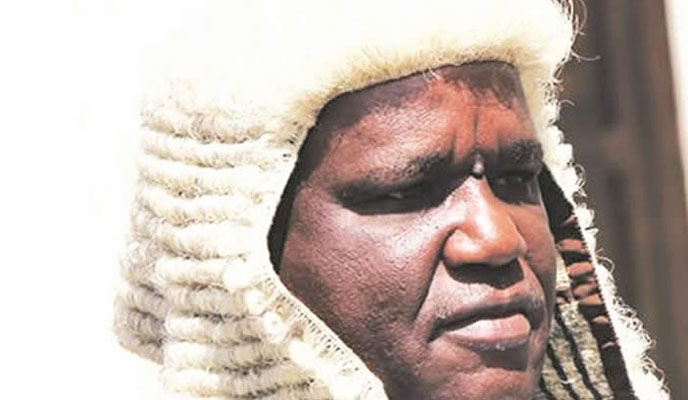
DRAMA is the last thing one would want to associate with a serious job interview, particularly for the lofty office of the Prosecutor-General, yet last Monday’s Judicial Services Commission (JSC) interviews were not short of it, as the seven candidates went through the mill.
BY PAIDAMOYO MUZULU
When the interviews started one candidate, Jacob Manzunzu, withdrew his candidature on a technicality and seven brave nominees were willing to go under the spotlight despite the PG’s office being a poisoned chalice. The last two holder of the office Johannes Tomana and Attorney-General Sobuza Gula-Ndebele left without completing their tenures under a cloud.
The seven candidates that came to the interviews were Charles Chinyama, Ray Goba, Wilson Manase, Misheck Hogwe, Tecler Mapota, Peter Mafunda and Florence Ziyambi.
Chinyama was the first in the hot seat. He seemed very confident as he sat facing the JSC panel, in a room filled mostly by the audience. He boasted about his impressive 19 years’ experience in criminal law and readiness to serve in the office of PG, but that was before the questioning became heated.
Attorney-General Prince Machaya was the first to throw a salvo when he asked: “Mr Chinyama how big is your practice?”
Chinyama responded: “It’s only me and one assistant. This is due to the harsh economic environment. At my peak, I had four assistants who each had two clerks.”
Machaya was not done yet. He prodded further: “Do you think that gave you experience to run a big organisation?”
- Chamisa under fire over US$120K donation
- Mavhunga puts DeMbare into Chibuku quarterfinals
- Pension funds bet on Cabora Bassa oilfields
- Councils defy govt fire tender directive
Keep Reading
Chinyama responded: “The principles of management are the same whether the organisation is big or small.”
Commissioner Josphat Tshuma turned on the heat when he asked: “Mr Chinyama, you have 13 pending complaints against you at the Law Society (of Zimbabwe)?”
Chinyama responded: “No. They are actually 14.” The response drew laughter from the auditorium.
By then the interview was going one way and it was left to Commissioner Lloyd Mhishi to do a coup de grace.
Mhishi asked: “You have practised for 19 years, but I did not see any of your cases reported in the law reports. Why?”
“I’m not sure why they were not reported. I have handled some big cases. At one point, I handled a murder case, but the client confessed to the crime when I was about to make an application for discharge as the body had not been found.”
Chief Justice Luke Malaba left the gallery in stitches when he commented: “You (Chinyama) seem to attract these complaints. Your conduct gives rise to these cases because of your failure to comply with rules.”
Acting Prosecutor-General Ray Goba was the next to face the panel.
He exhibited confidence and experience during the preliminary questions, until his conviction in Namibia on charges of obstructing the course of justice was pulled out of the drawer.
“It is a regrettable incident. The conviction arose out of a minor road traffic offence and the Namibian authorities did not consider it serious, as they did not dismiss me from employment, but went on to promote me not once, but twice after the conviction,” Goba said.
Goba went to great lengths to make sure the audience and the panel understood the circumstances of the conviction which he quipped: “I was a victim of a grave injustice.”
Manase was the other candidate who had some anxious moments when asked about his alleged corrupt tendencies related to Air Zimbabwe.
Manase told the panel: “Those were lies. I have sued the paper and the reporter.”
The panel was not satisfied and queried what became of the case.
Manase paused before answering: “We tried to negotiate an out of court settlement.”
Time had passed when Mafunda was called to the interview room. Unbeknown to him and the small audience still in the room, Mafunda’s interview was to be the shortest, a mere one minute.
Chief Justice Malaba asked Mafunda how long he had practised and if he could calculate it.
Mafunda took a pen and made calculations before saying:“I have practised for nine years, nine months.”
Malaba then dismissed him saying: “It is unfortunate that you do not make up the 10-year minimum period of practice. We have to follow the Constitution and we cannot entertain you in this interview. We do appreciate your effort. You are, therefore, free to leave.”
Florence Ziyambi was the last candidate on the stand and had a torrid time about fanning factionalism in the National Prosecuting Authority.
She was also asked about her involvement in the sacking of the last two PGs, as she was a witness to tribunals that recommended the dismissals of the duo.
Mhishi asked her: “On three occasions the appointing authority did not find you suitable to hold that office and, instead, other people were appointed?”
Ziyambi responded that she was not keen on being appointed, but her participation this time was a result of a nomination.
The commission for now is still consulting and making comments about the candidates. It is expected to forward three names to the President for consideration to be appointed.
It is now left to President Robert Mugabe to make the final choice, but the audience had a glimpse into the calibre of men and women who seek to become the chief prosecutor of this country.











